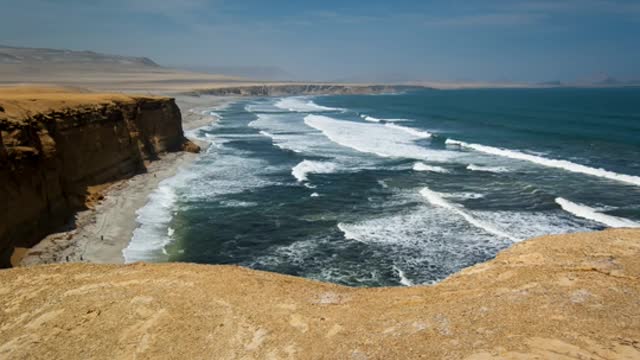Premium Only Content

The sea, the world ocean or simply the ocean is the connected body of salty water that covers over 70 percent of the Earth's surface. It moderates the Earth's climate and has important roles in the water cycle, carbon cycle, and nitrogen cycle. It has been travelled and explored since ancient times, while the scientific study of the sea—oceanography—dates broadly from the voyages of Captain James Cook to explore the Pacific Ocean between 1768 and 1779. The word "sea" is also used to denote smaller, partly landlocked sections of the ocean.
The most abundant solid dissolved in sea water is sodium chloride. The water also contains salts of magnesium, calcium, and potassium, amongst many other elements, some in minute concentrations. Salinity varies widely, being lower near the surface and the mouths of large rivers and higher in the depths of the ocean; however the relative proportions of dissolved salts varies little across the oceans. Winds blowing over the surface of the sea produce waves, which break when they enter shallow water. Winds also create surface currents through friction, setting up slow but stable circulations of water throughout the oceans. The directions of the circulation are governed by factors including the shapes of the continents and the rotation of the earth (the Coriolis effect). Deep-sea currents, known as the global conveyor belt, carry cold water from near the poles to every ocean. Tides, the generally twice-daily rise and fall of sea levels, are caused by the rotation of the Earth and the gravitational effects of the orbiting Moon, and to a lesser extent of the Sun. Tides may have a very high range in bays or estuaries. Submarine earthquakes arising from tectonic plate movements under the oceans can lead to destructive tsunamis, as can volcanoes, huge landslides or the impact of large meteorites.
A wide variety of organisms, including bacteria, protists, algae, plants, fungi and animals, live in the sea, which offers a wide range of marine habitats and ecosystems, ranging vertically from the sunlit surface waters and the shoreline to the enormous depths and pressures of the cold, dark abyssal zone, and in latitude from the cold waters under the Arctic ice to the colourful diversity of coral reefs in tropical regions. Many of the major groups of organisms evolved in the sea and life may have started there.
The sea provides substantial supplies of food for humans, mainly fish, but also shellfish, mammals and seaweed, whether caught by fishermen or farmed underwater. Other human uses of the sea include trade, travel, mineral extraction, power generation, warfare, and leisure activities such as swimming, sailing and scuba diving. Many of these activities create marine pollution. The sea is important in human culture, with major appearances in literature at least since Homer's Odyssey, in marine art, in cinema, in theatre and in classical music. Symbolically, the sea appears as monsters such as Scylla in mythology and represents the unconscious mind in dream interpretation.
-
 59:52
59:52
VINCE
2 hours agoDoes This Move Mean Justice Is Finally Coming? | Episode 29 - 04/24/25
66.6K69 -
 LIVE
LIVE
LFA TV
13 hours agoALL DAY LIVE STREAM - 4/24/25
3,265 watching -
 29:06
29:06
Standpoint with Gabe Groisman
1 day agoIran’s Rise Under Joe Biden
692 -
 LIVE
LIVE
Bannons War Room
2 months agoWarRoom Live
18,325 watching -
 LIVE
LIVE
Discover Crypto
1 hour ago$200K BITCOIN Happening: Nation-State ACCUMULATION Underway!
154 watching -
 2:37:20
2:37:20
Scammer Payback
19 hours agoCalling Scammers Live
2K -
 LIVE
LIVE
The Big Mig™
2 hours agoZelensky The Man With NO Cards To Play
5,362 watching -
 1:23:13
1:23:13
Dear America
2 hours agoUS Military IS BACK, Sees RECORD Numbers + Dem Rep. Calls For Outrageous Minimum Wage Increase!
55.8K20 -
 LIVE
LIVE
Badlands Media
4 hours agoBadlands Daily: April 24, 2025
4,784 watching -
![🔴[LIVE] Markets Whipsaw, Breaking News & Live Trading || The MK Show](https://1a-1791.com/video/fww1/09/s8/1/J/o/K/E/JoKEy.0kob-small-The-MK-Show-Apr.-24th.jpg) LIVE
LIVE
Matt Kohrs
10 hours ago🔴[LIVE] Markets Whipsaw, Breaking News & Live Trading || The MK Show
956 watching